Reviews
George Pal
USA, 1960
Credits
Review by Adam Balz
Posted on 08 August 2010
Source MGM DVD
Categories Favorites: Time Travel
It’s a sad fact of life that the films we cherish as adolescents often diminish in quality as we grow older. The nostalgia we feel can’t compete with the knowledge that the characters are underdeveloped, the plot is too simplistic, the music is too distracting, or the special effects, while advanced for their time, are now distractingly amateurish. Those wonderful rare exceptions - The Wizard of Oz, Willy Wonka and the Chocolate Factory, and, more recently, The Iron Giant - often owe their endurance to their ability to transcend genre and format to offer themes that every generation can appreciate equally. We all understand Dorothy Gale’s homesickness, her need to be back where she comes from, even if that means abandoning a Technicolor paradise for the grays and blacks of Depression-era Kansas, where her only friend is a small dog. Similarly, the child inside all of us smiles when Charlie wins a tour of a candy factory - and one led by a flamboyant, egomaniacal confectioner to boot - but the practical, realistic adult is made happy by the morality of Charlie’s final decision, in which he returns a piece of candy that could lift his family out of poverty once and for all, simply because he values dignity and self-respect over money. And to understand Hogarth Hughes, the adolescent protagonist of The Iron Giant, we need only the ability to understand and appreciate friendship in all its forms, even in an age when “friend” is a verb linking even the most anonymous people online. In the end, no matter how well or poorly these films are made, they endure because of their themes and underlying messages about home and family, ethics, and friendship. Of the dozens of films I remembered fondly from my childhood, none seemed more perfect for this kind of transcendence than George Pal’s 1960 film The Time Machine. With fond recollections of watching and rewatching Pal’s film, sometimes double-featured with The War of the Worlds, I expected to see a different, more mature side to an already personal film—something that, considering its depictions of nuclear fallout and a victimized civilization, would resonate today. And, in a sense, it does, though not in the ways that I had expected.
Opening at the end of the 19th century, The Time Machine begins in a small English home, where four men await the arrival of their host for dinner. They are each fashionably dressed, and as they wait they smoke cigars, sip wine, and offer few words to one another. Around them, a large collection of clocks ticks away the time; their host, a man named George Wells, has a deep and abiding fascination with time, an interest the other men seem to find mildly annoying. After they are invited to sit for dinner without George, he bursts into the room, his clothes torn and dirty, his skin muddied and red. He sits, swallows a glass of wine, and begins telling the men where he has been: a post-apocalyptic future in which the earth has grown new species of plants, there is nary a trace of technology, and the only humans - descendants of those who survived a nuclear holocaust in the 20th century - have divided themselves into two distinct groups. The first are the Eloi, all of whom are young, clad in pastoral clothing, and intolerably careless; they have little knowledge or intellectual curiosity, dine on food they themselves have not picked, and regard George’s incessant questioning as bothersome, even after he saved one of their own from drowning. When George asks a young Eloi man to show him their books, he is disheartened to find a few lonesome shelves stocked with texts that crumble in his fingers. These books, George notes, were the last visible testament to the history and progress of mankind, and they were allowed to decompose.
Soon, George discovers why. The Eloi girl he saved from drowning tells him about the other successors of the human race - the Morlocks, who are the hairy, blue-skinned, light-sensitive descendants of those who took refuge in fallout shelters and refused to leave once the nuclear war was over. They are creatures with dominion over the Eloi. They are also cannibals, harvesting the Eloi people for food, and the Eloi’s stagnant lifestyle is the Morlocks’ greatest weapon. Without knowledge, compassion, or empathy, the Eloi are perfect victims, at one point lured into the Morlocks’ lair by sirens that have an instant, almost hypnotic effect. Seeing their helplessness, George decides to fight the Morlocks singlehandedly, attacking them in their underground lair while simultaneously teaching the Eloi how to begin to defend themselves. When he climbs into his time machine and returns to the past, George does so in haste—he is surrounded by Morlocks, and his departure leaves the fate of the Eloi in doubt, even though they exist thousands of years in the future.
Pal’s film, which was one of my favorite films as a child - the story of one man rising up to save all of human civilization - now feels like the story of a pathetic, lonely man’s attempts at saving his idea of human civilization. George’s recollection of his journey into the future begins days before the dinner, when he unveils a prototype of the time machine to the very same four men. He argues with them about time, telling them that he believes in traveling all possible dimensions—not just up and down, forward and backward, left and right, but through time. The four men immediately dismiss George’s ideas as nonsense. Even Darby, George’s defender, seems unsettled by his friend’s obsessions with traveling through time, though his attempt to dissuade George from continuing on reveals the inventor’s true motive: he does not believe the era in which they live - a world focused on the Boer War in Africa and on destruction elsewhere - is for him, and he is sure human beings will some day find peace and contentment in their lives. This is an idealistic sentiment, sure, but one not without its millions - and, perhaps today, billions - of subscribers. George’s initial furloughs into the future prove him wrong, as he steps into an England in which Filby has died in World War I and his hometown is bombed during World War II. It’s only when George enters the 1950s, an era in which people’s lives are guided by air-raid sirens and the world is ultimately destroyed by a nuclear holocaust, is George forced to push his machine to the limits, bypassing decades and centuries in favor of millennia, stopping finally in the year 802,701.
However, George’s reaction to the Eloi is where my long-nurtured love of this film began to deteriorate. When George becomes frustrated over the Eloi’s mindless, indulgent lifestyle, he does so without knowing the full story, yet his incessant need for them to demonstrate similarities to his own ways of life - the life he thought was so terrible, the one he yearned to escape, the one that was devastated by nuclear weapons and evaporated into dust on the Eloi shelves - is surprisingly close-minded, what academics might refer to as colonial. The questions he poses to the Eloi over dinner - about their laws and government, both of which are nonexistent - feel like those an explorer would pose to a group of tribesmen he discovered in the jungles of some unexplored country, testing their grasp of a Western-style of living they would naturally be unaccustomed to and using that lack of knowledge as proof of inferiority. And while George’s desire to educate the Eloi does serve a purpose, it’s this same need, done in order to save them from the Morlocks, that is reminiscent of long-ago mercenaries attempting to “save” non-Europeans from their so-called pagan and savage ways.
All of this wouldn’t matter if it weren’t for the film’s closing scene. After George concludes his story and the four men begin to leave, still unconvinced, George returns to his laboratory. Soon, the hum of a machine fills his home, and the walls begin to shake. When Filby breaks down the laboratory door, he finds the room empty; the only evidence of the machine’s existence are marks on the floor where George repositioned it. Furthermore, Mrs. Watchett, George’s housekeeper, discovers three books missing from the shelves in his study, though she doesn’t know the titles of those three. The suggestion is that George has returned to the Eloi to educate them, thereby saving them from the Morlocks once and for all. As a child, I thought this was a noble endeavor, and I echoed Filby’s closing remarks to Mrs. Watchett - “What three books would you take?” - by scouring my own scant library, looking to see what three would be the most useful to a future society. Years later and decades wiser, I find that Filby’s question now bears a heavier burden: I’d like to think a man of George’s learning would take three basic books with him - a dictionary, perhaps, or a guide to agriculture, or an introduction to democratic governance - though I’m left to wonder what a man as desperate as George would do. He himself admitted to wanting a world unlike that of the late 19th century, so his selection may contain a subtle bias. He wants - needs - to teach them how to be a decent civilization, which seems like a noble effort on the outside, even though it means destroying the Eloi’s identity, as scant and undeveloped as that may turn out to be. This, as we have seen time and again throughout history, is a dangerous endeavor, one for which George is entirely unprepared.
Perhaps my attitudes toward this film were spoiled by my own future, or that of the world I grew up into—one infused with partisanship and a preference for being right instead of being successful; one in which anyone in a position of power who claims to be working for good is, in fact, working only for themselves. But The Time Machine, both the original novel by H.G. Wells and Pal’s film adaptation, is always interpreted differently depending on the time in which the text is engaged. Some discuss Well’s life story, noting how the author spent much of his life defending those who were impoverished and interpreting his novel as a functioning allegory of how the working class in Victorian England was manipulated like the Eloi - kept from a decent education, dependent on the superior members of society for basic necessities, and dispensed by those same people when they re no useful - and how they needed a hero to fight for them. Others recall the era in which the film was released and make a connection to the Cold War, seeing Pal’s depiction of the Morlocks against the Eloi as an allegory of Soviet Communism and the hedonism of America’s beatnik subculture, one that freely devalued any form of establishment knowledge as the problem instead of the solution.
Given the film’s nature, and especially George’s longing for something he cannot achieve, I hesitate to feel nostalgic for this film. We grow older, and things once held in favor soon lose their appeal—that’s just the nature of time, the nature of growing up and growing older. There’s nothing we can do to stop it from happening, and even if we could do what George Wells does and invent a machine that might help us alter it, there’s no guarantee that what we find, either in the future or the past, is actually what we’re looking for. Perhaps some films are just meant to fade away, to be a part of our childhood but not our adult lives. Perhaps that is the purpose they serve, and trying to fight that will bring only unhappiness. And yet, maybe there is a lesson to learn here, something that rises above the film. If George, disturbed by the events of his own time, would actually take a stand and be proactive - run for politics, become a journalist, use his skills as an inventor to provide more opportunities for reconciliation and peace - rather than pining for an idealistic future, one that is almost eight hundred thousand years away, he could see some of his dreams realized without having to escape his reality. George Wells has quite the mind, one engaged in not only science but also society and morality, so it’s a shame that he thinks of nothing more than himself.
More Favorites: Time Travel
-

Bill and Ted’s Excellent Adventure
1989 -
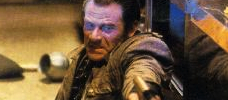
Trancers
1985 -
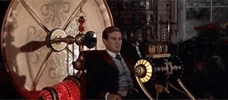
The Time Machine
1960 -

Groundhog Day
1993 -

Warlock
1989 -

The Navigator
1988 -
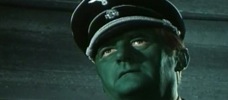
Tomorrow I’ll Wake Up and Scald Myself with Tea
1977 -
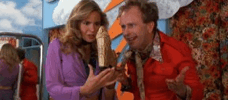
The Spirit of ‘76
1990 -
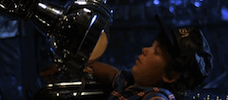
Flight of the Navigator
1986 -

La jetée
1962 -
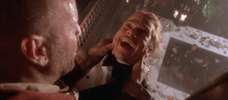
Twelve Monkeys
1995 -

Beastmaster 2: Through the Portal of Time
1991 -
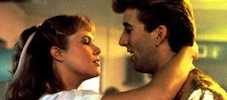
Peggy Sue Got Married
1986 -
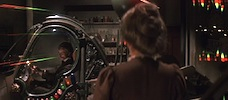
Time After Time
1979 -

Somewhere in Time
1980 -
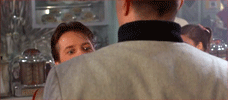
Back to the Future
1985 -

Back to the Future Part II
1989 -
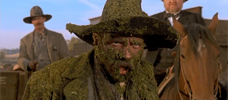
Back to the Future Part III
1990 -
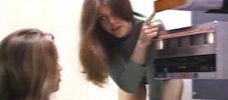
Idaho Transfer
1973 -
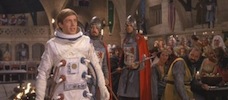
Unidentified Flying Oddball
1979 -
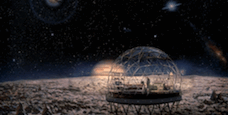
Slaughterhouse-Five
1972 -

The Lake House
2006 -

Time Bandits
1981 -

Doctor Who
1963–present -

Doctor Who
1963–present
We don’t do comments anymore, but you may contact us here or find us on Twitter or Facebook.



